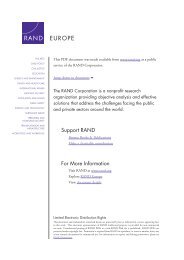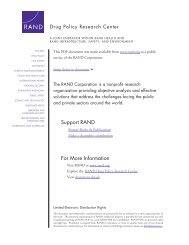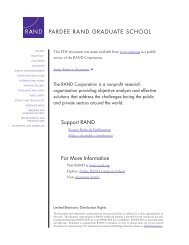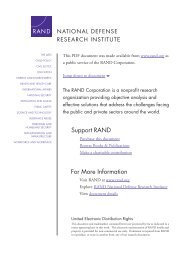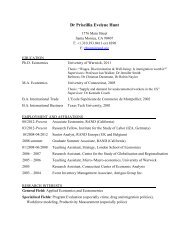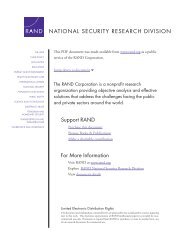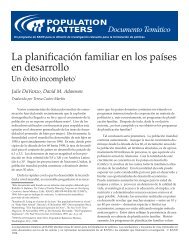The Benefits to Taxpayers from Increases in Students - RAND ...
The Benefits to Taxpayers from Increases in Students - RAND ...
The Benefits to Taxpayers from Increases in Students - RAND ...
You also want an ePaper? Increase the reach of your titles
YUMPU automatically turns print PDFs into web optimized ePapers that Google loves.
Analytic Approach 15<br />
effects of education on earn<strong>in</strong>gs capacity. All agree that <strong>in</strong>creases <strong>in</strong> education resulted<br />
<strong>in</strong> <strong>in</strong>creases <strong>in</strong> earn<strong>in</strong>gs capacity. While the results differ slightly depend<strong>in</strong>g on the<br />
approach and data, the common f<strong>in</strong>d<strong>in</strong>g is that an additional year of school<strong>in</strong>g leads,<br />
on average, <strong>to</strong> an <strong>in</strong>crease of 7–10 percent <strong>in</strong> earn<strong>in</strong>gs capacity.<br />
Card (1999) provides a thorough review of related economics literature, focus<strong>in</strong>g<br />
on models and estimation results <strong>from</strong> several different estimation approaches. He also<br />
f<strong>in</strong>ds that studies generally agree that education has a positive causal effect on earn<strong>in</strong>gs<br />
capacity. In a separate, more recent review of the benefits of education, Krueger and<br />
L<strong>in</strong>dahl (2001) conclude that each additional year of school<strong>in</strong>g appears <strong>to</strong> raise earn<strong>in</strong>gs<br />
capacity by about 10 percent.<br />
Calculations of the effect of education level on earn<strong>in</strong>gs capacity have been challenged<br />
on the grounds that the calculations are biased. Specifically, some critics ma<strong>in</strong>ta<strong>in</strong><br />
that <strong>in</strong>dividuals with greater ability (e.g., because of greater <strong>in</strong>telligence or more<br />
aggressive attitudes) choose <strong>to</strong> obta<strong>in</strong> more education, and so it is the fact that they have<br />
greater ability <strong>in</strong> the first place, rather than their additional education, that accounts<br />
for their higher earn<strong>in</strong>gs capacity. However, studies generally f<strong>in</strong>d a higher impact of<br />
education on earn<strong>in</strong>gs capacity, <strong>in</strong>stead of a lower one, when tak<strong>in</strong>g <strong>in</strong><strong>to</strong> account such<br />
potential biases. <strong>The</strong>se tests for causality <strong>in</strong>clude studies that <strong>in</strong>clude data on attitudes<br />
and other fac<strong>to</strong>rs that could <strong>in</strong>fluence earn<strong>in</strong>gs capacity and studies of tw<strong>in</strong>s and sibl<strong>in</strong>gs<br />
that completed different levels of education (Rouse, 2005). <strong>The</strong>se studies f<strong>in</strong>d, for<br />
example, that persons with high <strong>in</strong>nate ability who term<strong>in</strong>ate their education at a low<br />
level, possibly because of family f<strong>in</strong>ancial circumstances, do better <strong>in</strong> the labor market<br />
than others with lesser ability who complete the same level of school<strong>in</strong>g. Conversely,<br />
persons with low ability who drift through several levels of school<strong>in</strong>g tend <strong>to</strong> earn less<br />
than others with higher ability who complete the same level of school<strong>in</strong>g. This strongly<br />
suggests that education does have a causal effect on earn<strong>in</strong>gs capacity, whether we consider<br />
personal ability or not.<br />
Estimates of the effect of education level on earn<strong>in</strong>gs capacity, us<strong>in</strong>g “simple”<br />
methods that do not take <strong>in</strong><strong>to</strong> account potential ability and background bias, range<br />
<strong>from</strong> 2 <strong>to</strong> 11 percent greater earn<strong>in</strong>gs capacity per year of school<strong>in</strong>g and cluster around<br />
7 percent. Estimates that take those biases <strong>in</strong><strong>to</strong> account f<strong>in</strong>d that each additional year<br />
of school<strong>in</strong>g <strong>in</strong>creases earn<strong>in</strong>gs capacity by 5 <strong>to</strong> 14 percent and cluster around 10 percent.<br />
For example, Ashenfelter, Harmon, and Oosterbeek (1999) f<strong>in</strong>d a 6.6 percent<br />
and 9.3 percent <strong>in</strong>crease <strong>in</strong> earn<strong>in</strong>gs capacity us<strong>in</strong>g simple and advanced methods,<br />
respectively.<br />
Most of these studies that we reviewed were completed <strong>in</strong> the 1990s and used data<br />
<strong>from</strong> the 1980s and 1990s. Because the differences <strong>in</strong> the wages and salaries paid <strong>to</strong><br />
persons with different levels of school<strong>in</strong>g have generally <strong>in</strong>creased over time, these studies’<br />
estimates understate the current effects of education level on earn<strong>in</strong>gs. Table 2.1<br />
shows the ratios of median weekly earn<strong>in</strong>gs by educational atta<strong>in</strong>ment for men and




